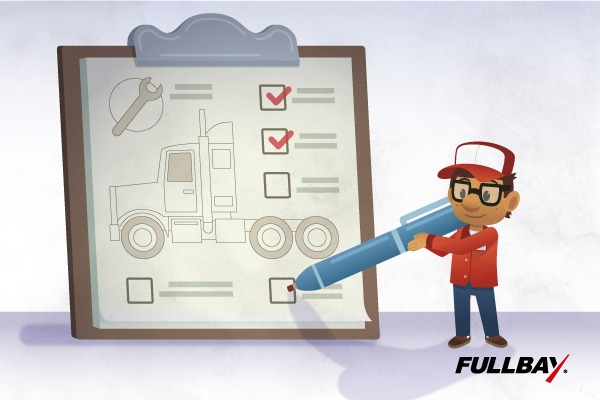The Importance of Preventive Fleet Maintenance

Fleet managers of the world, we love you.
Yes, drivers are incredibly important, as are technicians and parts managers and everyone else. But fleet managers put together the vast armadas of vehicles that roam across the highways and interstates. They ensure those fleets deliver their goods on time and the trucks get serviced or repaired when necessary.
Maintenance, though. Easy enough to manage on one truck, but not everyone is looking after just one truck. Some of you have dozens of vehicles in your charge. Maybe even hundreds.
If you haven’t yet looked at fleet preventive maintenance as a benefit to your company, now’s the time. By keeping meticulous track of the PM work your vehicles require and receive, you can help them stay out on the road and spend less on maintenance overall, especially expensive roadside repairs.
Curious? Let’s talk about fleet preventive maintenance and why you need it.
PROTECT YOUR FLEET, PROTECT YOURSELF
We talk a lot about how great preventive maintenance is overall, so we won’t perform the whole song and dance again. But here’s the gist of why keeping on top of PMs is important:
- Parts wear down over the course of months or years
- Parts endure additional wear and tear due to road or weather conditions
- Parts need to be upgraded
If you don’t get your vehicle the maintenance it needs, when it needs it, odds are it will continue to run for a while…on borrowed time. Eventually, the part (or parts) will wear out completely. This can lead to:
- An immediate breakdown
- No immediate breakdown, but further problems as other parts are damaged
- Performance issues, often in the form of low MPGs
A single truck knocked out of commission can lead to a cascade of problems, from missed deliveries and shipments to late invoices or bills that simply aren’t paid. Multiply that out by everyone dependent on the delivery, from your own staff to their families, to the truck driver now stranded on the road, to the people who needed the goods the truck was delivering.
Pretty heady stuff, huh?
Now multiply that by however many trucks your fleet has.
That’s a lot of potential money left on the table. The larger your particular fleet, the more work and money you need to put into keeping it running. If you aren’t investing in preventive maintenance for your fleet, then that’s even more potentially expensive roadside repairs for you to deal with.
There is an additional factor that you, the fleet manager, need to take into consideration when figuring out maintenance. If something goes wrong with a truck and individuals are harmed – whether it’s the driver or bystanders – guess who could be on the hook? You. Your entire job revolves around keeping this delicate machinery safe to operate and be around. If there is an accident or some other misfortune, it’s likely authorities will turn to maintenance records to see if the event could have been prevented.
HOW TO DEVELOP A PM PROGRAM FOR YOUR FLEET
If you’re ready to prevent roadside repairs and other associated catastrophes, start building out a PM program for all the trucks in your fleet.
You have some freedom in how you set it up; the most important thing is that it suits your fleet and your business. The easiest way to get started is to put together a PM checklist that will hold all the information compiled about your vehicles. Think things like:
- Battery and charging system
- Brake systems
- Internal engine and overhead adjustment
Each time your trucks go in for service, they should be inspected to ensure everything on the checklist is taken care of.
Which brings us to technicians.
FIND A SHOP TO HELP YOU TRACK PMS
The bigger your fleet, the more moving parts (literally) you’ll need to track. If this is an added drain on your time, look into partnering with a repair shop that can track PMs for you. Bonus points if they can handle some predictive maintenance too.
How they do it is up to them, but we suggest finding a shop that is willing to alert you when maintenance comes due – and better yet, harass you a bit if you don’t bring the truck(s) in for service. Some shops have adopted software that will even send out automatic notices to fleet managers indicating what kind of service a truck needs and – if you’ve been putting it off – how long it’s been necessary.
When it comes to something as critical as tracking the maintenance of an entire fleet, look for a shop that can be your partner, not just a place you bring your injured vehicles. Bonus points if they have a customer portal where you can see everything they’re working on and check in on upcoming service.
DO YOU HAVE AN INTERNAL REPAIR SHOP?
If your fleet has its own repair shop, you face an interesting quandary. You can keep a closer eye on things if you want…but that can devour a lot of your time.
We suggest investing in strong software that will help you track your PMs. An app like Fullbay, for example – c’mon, you knew this was coming: it is the name of our website – offers you three ways to track PMs:
- Fleet Report: Which units need service, which don’t, and which need it right now.
- Fleet Cost Per Unit Report: Shows you labor and parts cost, mileage, cost per mile, and other monetary breakdowns.
- Unit Records: Zero in on individual trucks and find out everything you need to know about them, from mileage history to customized PM schedules.
SUMMING UP
There’s only one thing worse than a truck stranded due to a breakdown that could have been prevented – a lot of trucks stranded due to breakdowns that could have been prevented. If you’re wrangling the logistics of multiple vehicles and all the people attached to or dependent on them, do right by them and look into fleet preventive maintenance. Your people – and your trucks – will thank you.

